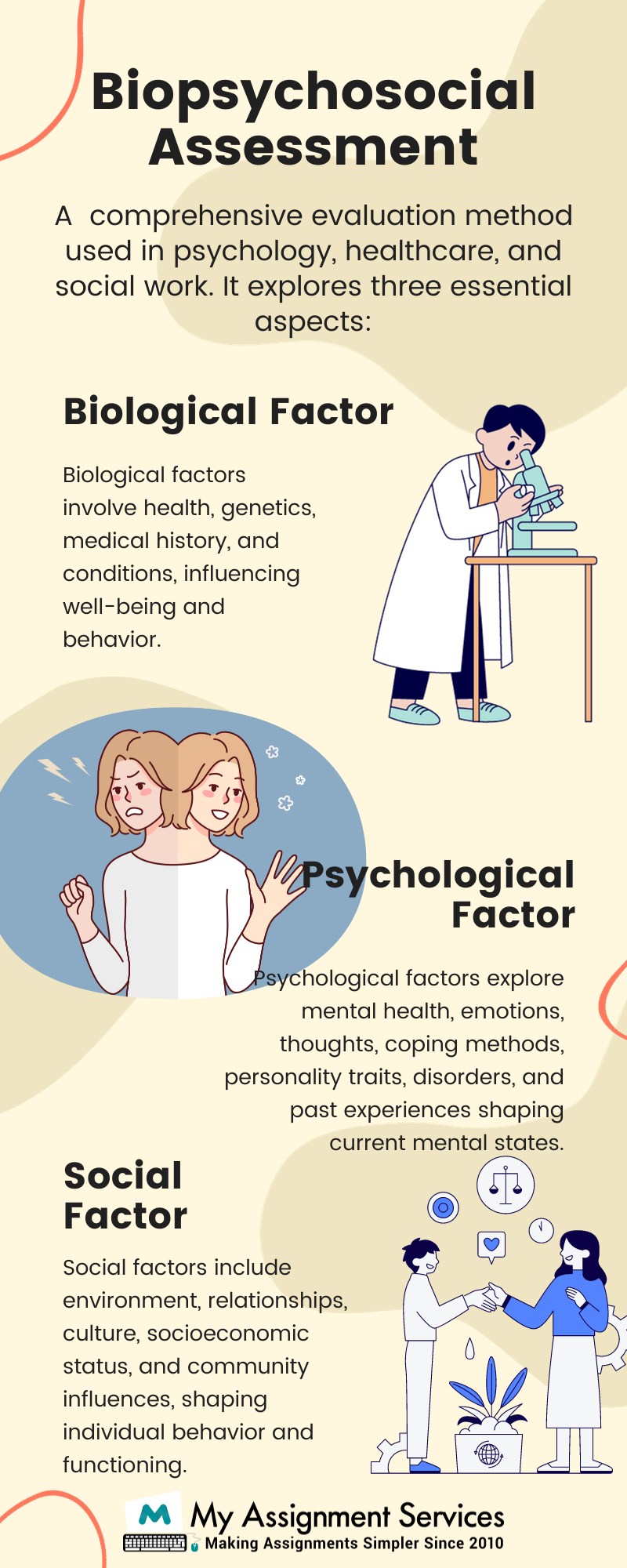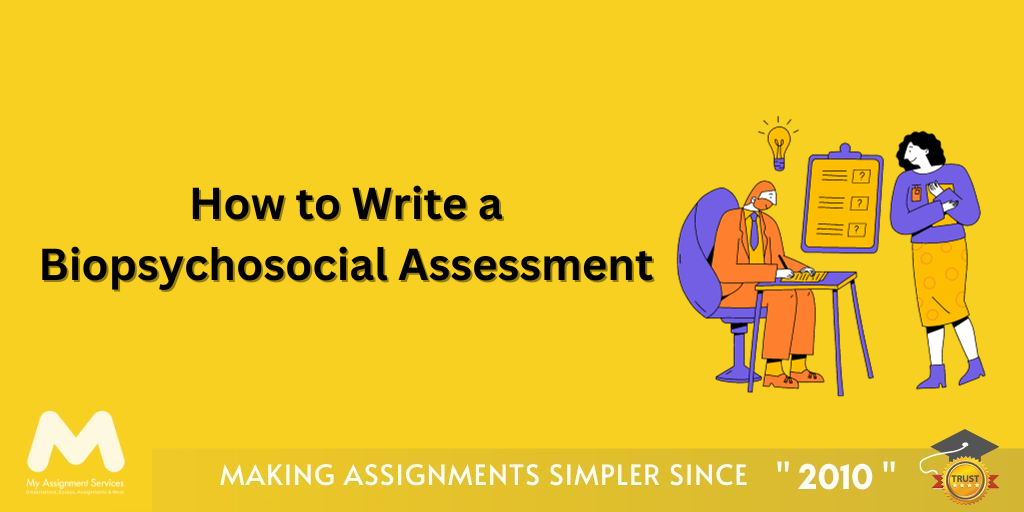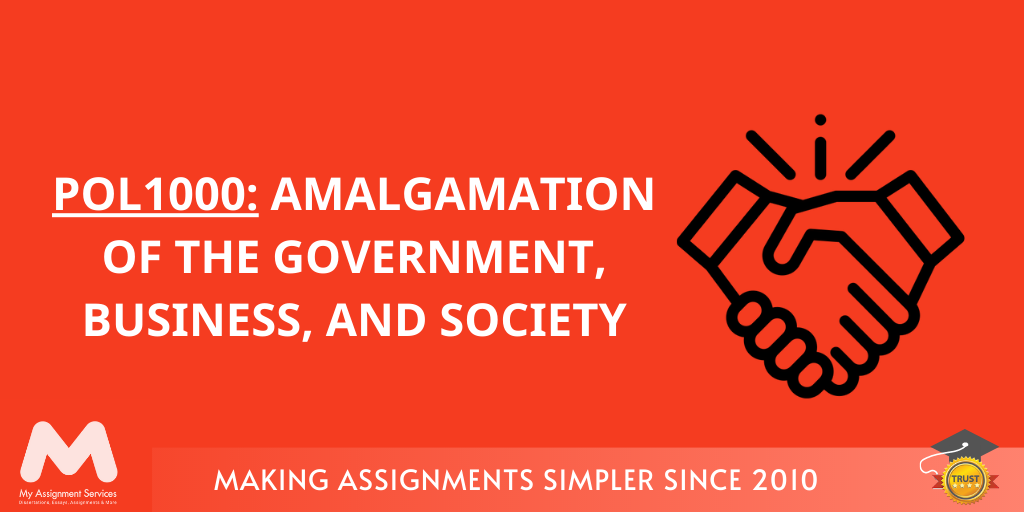Beginning the journey of understanding human behaviour is as fascinating as it is crucial in various fields. A biopsychosocial assessment, a comprehensive tool used in psychology and healthcare, delves into the deep layers shaping an individual's well-being. Imagine uncovering the influence of biological, psychological and social factors, shaping our thoughts, behaviours, and overall health.
This assessment goes beyond a mere checklist it's a holistic exploration unveiling the multifaceted aspects of human existence. Whether you're a psychology student, a healthcare professional, or intrigued by the complexities of the human mind for mental health assignment, this blog explores the fundamentals of crafting a compelling biopsychosocial assessment. Let's dive into this field, understanding how these assessments contribute to a deeper comprehension of human experiences and how students can effectively write one.
What is Biopsychosocial Assessment?

A biopsychosocial assessment is a comprehensive evaluation method used in psychology, healthcare, and social work. It explores three essential aspects:
Biological Factors
This encompasses the individual physical health, genetic makeup, medical history, and any conditions or illnesses they might have. It examines how biological factors contribute to a person's overall well-being and behaviour.
Psychological Factors
This delves into the individual mental health, emotions, thoughts and cognitive processes. It examines psychological aspects like coping mechanisms, personality traits, mental health disorders, and past experiences that shape their current mental state.
Social Factors
This involves the person's social environment, relationships, cultural background, socioeconomic status, family dynamics, and community influences. It looks at how social interactions, support systems, and societal norms impact the individual's functioning and behaviour.
The biopsychosocial assessment integrates these three dimensions to understand an individual holistically, considering how biological, psychological, and social factors interact and influence their overall health and well-being.
How to Conduct Research for Writing Biopsychosocial Assessment?
Now that you know the term, the next step in writing the assessment is conducting authentic research before writing. Conducting research for biopsychosocial assessments is essential for students in psychology, healthcare and related fields. Thus, engaging in systematic research practices is crucial to develop a comprehensive understanding and application of this assessment method. Here are steps to effectively conduct research for crafting a well-informed biopsychosocial assessment, with the assistance of assignment expert guidance:
âž” Define Objectives and Parameters
Clearly outline the goals and scope of the assessment. Identify the specific biological, psychological, and social factors you aim to explore. For instance, if focusing on a certain mental health condition, clarify which biological markers, psychological traits, and social determinants you will investigate.
âž” Gather Academic and Reliable Sources
Utilise academic databases, scholarly journals, textbooks, and reputable websites to gather information. Look for peer-reviewed articles, case studies, and research papers that provide insights into the interconnectedness of biological, psychological, and social elements relevant to your biopsychosocial assessment topic.
âž” Review Literature Methodically
Analyse existing literature and research related to your chosen subject. Evaluate studies that discuss the influence of biological factors (genetics, neurobiology), psychological aspects (cognitive processes, emotions), and social determinants (cultural influences, socioeconomic status) on the specific issue you are exploring.
âž” Cross-disciplinary Approach
Since the assessment integrates multiple disciplines, it explores information from various fields like biology, psychology, sociology, and anthropology. This interdisciplinary approach enhances the depth and comprehensiveness of your assessment.
âž” Critically Evaluate Information
Assess the reliability, relevance, and credibility of sources. Critically analyse the methodologies used in studies and the validity of their findings. Ensure the information aligns with academic standards and contributes effectively to your assessment's credibility.
âž” Synthesise Findings
Organise and synthesise the gathered information for your biopsychosocial assessment, highlighting connections and patterns between biological, psychological, and social factors. Develop a coherent understanding of how these elements interact and influence the individual's condition or situation.
Tips to Write Biopsychosocial Assessment Effectively
Building upon the foundations of systematic research, the journey towards crafting an effective assessment report becomes an exploration of interconnected human complexities. For students, solving this terrain and synthesising research findings into a cohesive assessment requires precision and insight. Thus, to ease this journey, here are practical tips derived from thorough research to assist students in effectively composing comprehensive assessment reports:
➢ Clear Introduction
Start with an overview of the biopsychosocial assessment purpose and the individual's background. Introduce the biological, psychological, and social aspects that will be explored.
➢ Structured Sections
Organise your report into distinct sections for each aspect biology, psychology, and social factors. Clearly label and separate these sections for easy reading.
➢ Use of Evidence
Support your analysis with evidence from reliable sources. Cite studies, research findings, or case examples to reinforce your observations.
➢ Interconnected Analysis
Explore how the biological, psychological, and social elements interact and influence each other. Highlight connections and correlations among these factors.
➢ Objective Language
Maintain a professional and objective tone throughout the biopsychosocial assessment. Avoid biases and subjective interpretations, focusing on factual observations.
➢ Recommendations and Interventions
Offer recommendations or interventions based on your analysis. Considering all three aspects, suggest strategies or resources that could positively impact the individual's well-being.
➢ Concise Conclusion
Lastly, summarise the key findings without introducing new information. Emphasise the importance of considering all dimensions in understanding the individual's situation.
Craft Effective Biopsychosocial Assessment with My Assignment Services!
As we conclude, remember that a biopsychosocial assessment is like connecting puzzle pieces to see the bigger picture of someone's life. These reports give us a deeper understanding by considering biology, psychological thoughts, and social connections they are not just about understanding but about making a difference in someone's life. Use these insights whether you are a student starting or a professional polishing your skills. Dive into complexities, link ideas, and create a complete portrait that brings empathy and clarity. So, are you ready to start? Share your experiences or questions with us at My Assignment Services and seek our online assignment help services. Also, visit our website for more information. Until then, let's keep exploring the fascinating world of human behaviour together.





